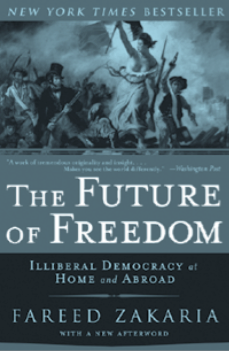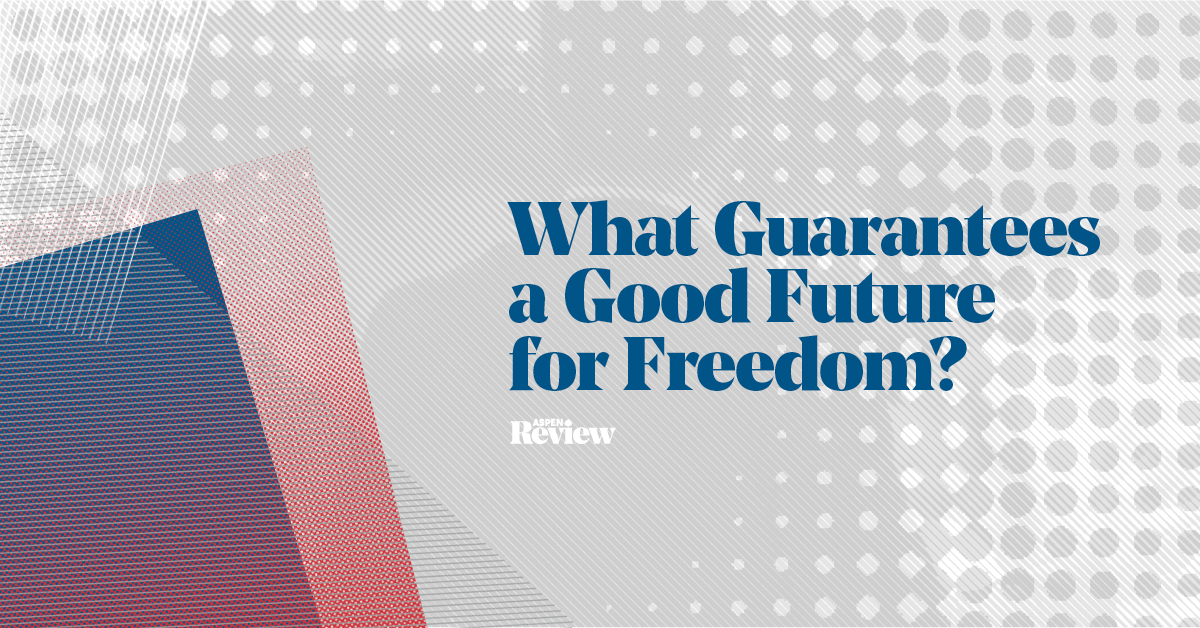 The Future of Freedom: Illiberal Democracy at Home and Abroad Fareed Zakaria
The Future of Freedom: Illiberal Democracy at Home and Abroad Fareed Zakaria
It is quite paradoxical that Fareed Zakaria’s Future of Freedom got published in Poland only when, its praise for the country’s democracy turned out to be an overstatement. To be sure, Central Europe is not the main topic of the book. Nevertheless, it is shown as an example of successful transition to fully-edged liberal democracy, which allegedly only great dose of contingent luck could be replicated in other parts of the world. “The line that separated Western and Eastern Christendom in 1500 today divides successful liberal regimes from unsuccessful, illiberal ones. Poland, Hungary, and the Czech Republic, which were most securely a part of Europe, are furthest along in consolidating their democracies,” goes once a cliché argument, put in doubt since the book was written. Zakaria is more nuanced than Huntington and when he writes about the parts of the world he knows better (take India), he steers clear of cultural determinism. Still, the journalist polymath fad did not serve well the promise made in the title: a few years on, the future of freedom looks much different than he expected—better in the post-Soviet area (Ukraine, Georgia, Armenia), worse in Turkey, not so obvious in Europe, much more complicated in the Arab countries of the Middle East.
The area where predictive capabilities failed the then editor-in-chief of Newsweek to an even greater extent is economy. The Great Recession hit only a few months after The Future of Freedom was written, putting in peril the comfortable stability of Western middle classes.
It is worth remembering that the latter ominous transition began with the Popolari slogans of empowering the “ordinary people” at the expense of the self-serving elite.
This has been of great importance for the prospects of individual freedom and liberal democracy: for centuries it has been the middle class who have carried liberal values. However, it did so only while optimistic: the economic downturn of 1870s led to the rise of European nationalism and anti-Semitism, the debt crisis after WWI ended the liberal period in Italian politics and brought Mussolini to power, the Great Depression of early 1930s did the same to frail Weimar democracy and for Hitler.
The Democratic Spirit Cannot Be Taken for Granted in the US Either
Compared to those precedents, the impact of the Great Recession is not yet as catastrophic. Still, the rise of reactionary populism in Europe—from Brexiters to French Front National to neo-fascists in Slovakia—is a fact, and even in the United States the durability of democratic spirits and republican institutions cannot be taken for granted. After all, ancient Rome made it from monarchy to exemplary republic and then back to bloody despotism. It is worth remembering that the latter ominous transition began with the Popolari slogans of empowering the “ordinary people” at the expense of the self-serving elite.
The relation between economic trends and democracy has been a subtle one and often went against the widely held beliefs. The illiberal turns meant closed borders and beggar-thy-neighbor policies which, while compromising overall efficiency, pleased nationalistically-minded electorates (Zakaria rightly points out that Otto von Bismarck’s extension of suffrage was meant to boost support for monarchy and keep urbanite liberals at bay).
By contrast, the periods of fast economic growth which resulted from global openness and free trade policies created envy (“Why the Joneses are getting richer and not me?”) and anxiety (Oswald Spengler started to write The Decline of the West in 1911, at the apex of European domination over the planet).
The popularity of liberal governments never lasted long—more often than not they were denounced for real or imagined corruption, lacking ideals, or being oblivious to the fate of “the common man.”
The popularity of liberal governments never lasted long—more often than not they were denounced for real or imagined corruption, lacking ideals, or being oblivious to the fate of “the common man.”
The “glorious thirty” years which followed WWII appear as an exception to the rule—one which can be easily explained. In Western Europe the liberal messages were accompanied by protectionist policies which were dismantled only slowly and very carefully. On the other side of the Atlantic, the American working class was free-riding on European protectionism and the autarchic policies of the Soviet Union, China, India, and the Third World. To use a metaphor, once all your neighbors have built strong fences, your sheep (in this case: the capital) is not going to escape.
Americans Became Less Satisfied with Their Political System
The situation began to change with the neoliberal revolution of 1980s. In the quarter of century before Zakaria wrote The Future of Freedom, the US gross domestic product increased by $5 trillion, or 50% per capita. Yet the Americans did not become any happier, and in any case they became less satisfied with their political system. Zakaria finds this surprising, but it is enough to have a look at one graph in Branko Milanović’s Global Inequality to understand what has happened: between 1988 and 2008 the real incomes of virtually all people in the world rose, except for those who started in percentiles 79 to 81 and whose earnings in real terms remained at the same level.
This group—better o than the bottom 78 percent of humanity, but poorer than its top 19 percent—includes the working class Americans. So, even though the overall impact of globalization was Pareto optimal (no one lost while some—in fact, great majority—gained), the lower strata of the US society had all reasons to consider themselves losers, especially in comparison to the proudly cosmopolitan elites who ended among top winners. This explains not only the unhappiness of the seemingly invidious American voters but also their turn towards chauvinistic populism.
In Systems with Proportional Representation the Position of Lobbyists Is Weaker
In the same period, the measures meant to democratize American politics turned out to have perverse effects. As Zakaria rightly points out, the greater transparency of the lawmaking process indeed increased control over the members of Congress. Unfortunately, the people who seized this control were various interest groups and not the public at large. Knowing the details of proceedings in the committees made it very easy for lobbyists to map the most vulnerable members. And then an all-out hijack of the federal budget started, further increasing the dissatisfaction with “Washington.” The calculus has been banal: “If a group of 100 farmers got together to petition the government to give them $10 million, the benefit to each farmer is $100,000. The cost to the rest of us is about 4 cents per person. Who is more likely to form a lobby, them or us?” asks Zakaria. In systems with proportional representation (and what goes with it—stronger and better disciplined parties), the position of lobbyists is weaker than in the US, but the mechanism of asymmetric incentives remains the same, benefitting the organized few at the expense of the public good.
The greatest merit of The Future of Freedom lies, however, not in explaining what went wrong with America, but in reminding us of the inherent tension between the majority principle and the rule of law.
The greatest merit of The Future of Freedom lies, however, not in explaining what went wrong with America, but in reminding us of the inherent tension between the majority principle and the rule of law. In a brilliant excursion into ancient history, Zakaria reminds us that the best-remembered decision of the Athenian popular assembly was to kill Socrates. The much-cherished Greek “freedom” was not about personal autonomy, but about ability to participate in the decision-making that would affect the entire polity. Those are two completely different things and only the cursory reading of ancient texts in 19th and 20th centuries led to merging them in a single confused concept.
The Dispersion of Power Arrangements Produces Free Societies
Zakaria gets a glimpse into this connection at the very beginning of the book, saying that “it all started when Constantine decided to move” and then claiming that “European history was marked by continual strife between church and state. From the sparks of those struggles came the first res of human liberty.” Unfortunately, he gets carried away by this particular example, elevating church and its democratizing role way too much—while missing the point that virtually any dispersion of power is beneficial for the freedom of individuals. In the classical Montesquieu conception it involves the independent judiciary and mutual checks and balances between executive and legislative branches.
Other aspects of the dispersion of authority are equally important: the local, regional, and state levels in multilevel governance systems such as US, EU, or India; the clear separation of religious and political spheres; the solid and enforceable property rights, including possibility to use this property as means of production; political parties with clear axiological footing, strong enough to provide their members with self-esteem even during long periods in opposition. And election rules which make all those institutions independent of each other and space over time the transitions of power so that not everything can get carried away by a sudden ideological fad.
The beauty of the dispersion of power arrangements is that they produce free societies a liberal democratic order even if none of the actors competing for power are deeply passionate about such an outcome. Take Poland, where Zakaria rightly points to the role played by the Catholic Church during democratic transition. Contrary to the widely spread but ungrounded beliefs, by no means did the Church want a fully-edged Western liberalism.
A Functioning Republic Does Not Need to Be Populated by Angels
This is best evidenced by the admonitions issued in the summer of 1988 by Józef Glemp, then Primate of Poland, to his own advisors who dared to recommend laic state and praised a pluralist society. Nevertheless, the Round Table contract of the next year paved a way for exactly such kind of political order—which lasted uncontested for a quarter of century, until an illiberal concept of democracy, based on a notion of primordial spiritual national community and strongly influenced by the peculiar ideology of Polish Catholicism, grew strong enough to become a real alternative.
Another illustration comes from Russia. Zakaria goes to great lengths lamenting all the opportunities for democratizing and liberalizing the country which Boris Yeltsin missed. This is naive. Yeltsin was a Soviet-trained politician, not a moral philosopher. No wonder he was a democrat only for as long as it was necessary and turned back to the old tested ways as soon as competitors for power weakened. In fact, it is not improbable that the best opportunity for establishing a liberal democracy in the post-Soviet space was to keep alive the federal USSR institutions which would counterbalance the national strongmen from Minsk to Moscow to Tashkent. Zakaria would probably agree, since he comments on his native India that its “semiliberal democracy has survived because of, and not despite, its strong regions and varied languages, cultures, and even castes.”
The beauty of the dispersion of power arrangements is that they produce free societies and a liberal democratic order even if none of the actors competing for power are deeply passionate about such an outcome.
All in all, the future of freedom seems pretty much similar to its past. Already in 1795, Immanuel Kant hit the nail on the head by explaining in the First Supplement to the Perpetual Peace that a functioning republic does not need to be populated by angels. Quite to the contrary—it should be built as if it were to be populated by the devil race, arranging the powers of each selfish inclination in opposition to each other. What matters is that the selfish devils be many and counterbalance each other.


